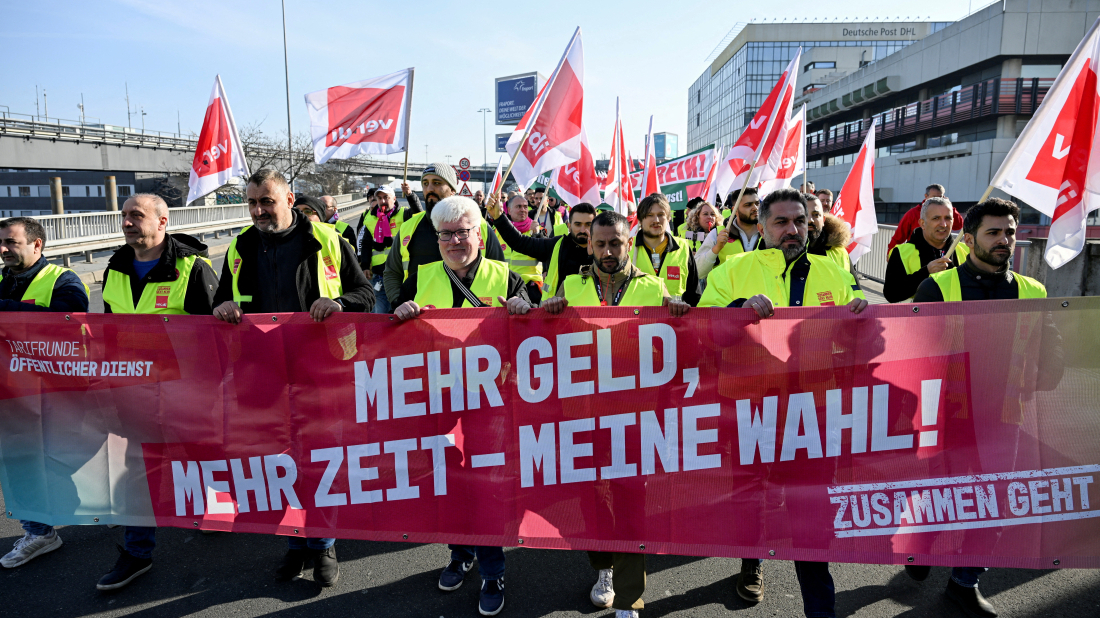Prime Minister Carney announces new Chief Trade Negotiator to the United States
The Prime Minister, Mark Carney, announced on 16 February that the Honourable Janice Charette has been appointed as the next Chief Trade Negotiator to...

A 24-hour strike at key German airports on Monday left over half a million passengers stranded, with over 1,000 flight cancellations, as workers demand higher wages and better conditions.
A 24-hour strike at major German airports on Monday left over half a million passengers stranded, severely disrupting air travel across the country. The strike, led by the Verdi union, affected 13 airports, including Germany's busiest, Frankfurt, where no passenger flights were allowed to depart. Over 1,000 flights were canceled at Frankfurt alone, with cancellations expected to rise and delays anticipated to continue into Tuesday.
Travelers had mixed reactions to the strike. While some sympathized with the workers' demands, others expressed frustration at the inconvenience. One stranded passenger, Frank Seier, acknowledged the workers’ desire for higher wages but noted that strikes often hurt the wrong people.
In contrast, Damian Zawierucha, another passenger, explained that his family was prepared for the disruptions after being notified in advance and was content to wait for their flight.
The strike stems from ongoing labor negotiations, with workers demanding an 8% wage increase or at least a 350-euro raise per month, along with higher bonuses and more time off. The Verdi union argues that the current working conditions, particularly the challenging shift work at airports, are unsustainable. However, employers have rejected the demands, calling them unaffordable.
Verdi spokesperson Matthias Venema criticized the lack of a concrete offer from employers, stating that without progress in negotiations, it would be difficult to move forward with collective bargaining.
The disruption extended beyond Monday, with Hamburg airport experiencing nearly 300 flight cancellations on Sunday, March 9, after ground handlers unexpectedly walked out. This surprise action caught many travelers off guard and exacerbated the chaos. Verdi explained that the sudden strike was meant to pressure employers into improving their offer, arguing that such actions were necessary for the negotiations to be taken seriously.
As the strike continues, the impact on air travel remains significant, and passengers are left uncertain about the coming days.
U.S. Ambassador to NATO Matthew Whitaker said China has the power to bring an end to Russia’s war in Ukraine, arguing that Beijing is enabling Moscow’s military campaign.
Austria’s Janine Flock won the gold medal in the women’s skeleton event at the Milano-Cortina 2026 Winter Olympics on Saturday.
Iran’s Supreme National Security Council Secretary Ali Larijani said the United States could evaluate its own interests separately from those of Israel in ongoing negotiations between Tehran and Washington.
U.S. Secretary of State Marco Rubio on Sunday (15 February) called it “troubling” a report by five European allies blaming Russia for killing late Kremlin critic Alexei Navalny using a toxin from poison dart frogs.
Israel’s National Guard is preparing to deploy drones capable of firing tear gas at Palestinians in the occupied West Bank, including East Jerusalem, as part of security preparations ahead of the Muslim holy month of Ramadan, Israeli Channel 12 reported on Saturday.
The Pentagon has threatened to designate artificial intelligence firm Anthropic as a “supply chain risk” amid a dispute over the military use of its Claude AI model, according to a report published Monday.
Representatives of Ukraine, Russia and the United States are set to meet in Geneva for a third round of trilateral negotiations aimed at ending the nearly four-year war, even as both sides intensify military pressure on the ground.
The Prime Minister, Mark Carney, announced on 16 February that the Honourable Janice Charette has been appointed as the next Chief Trade Negotiator to the United States.
Cuba’s fuel crisis has turned into a waste crisis, with garbage piling up on most street corners in Havana as many collection trucks lack enough petrol to operate.
Day 10 of the Milano Cortina 2026 Winter Olympics delivered high-stakes semifinals, dramatic finishes and classic podium moments across Milan and the Italian Alps. Photographers captured split seconds of symmetry before puck drops, explosive turns on the ice and triumphant celebrations.
You can download the AnewZ application from Play Store and the App Store.

What is your opinion on this topic?
Leave the first comment